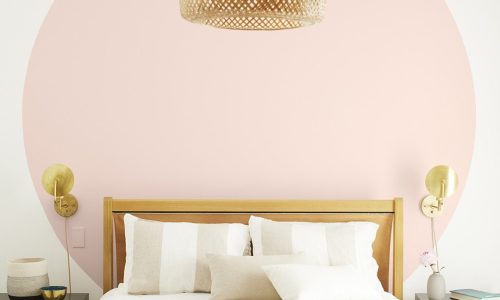By Scott Hamblen
The average bedroom, not counting master bedrooms, is about 120 to 140 square feet. Add a bed, dresser and nightstand, and space is at a premium.
While homeowners can’t move walls, there are a few ways to make a small bedroom look and feel larger.
The first step is to clean out any clutter occupying floor space, like dirty laundry, shoes and sporting equipment. Find an appropriate-sized storage solution for the closet or garage to free up real estate in the bedroom living space.
The second, and most important step, is painting the bedroom.
“If you have a small room in your home, you know it can be challenging to make it seem larger,” said Lou Manfredini, Ace Hardware’s home expert. “You can actually do it by adding color.”
Here’s how.
Understand Color Schemes
Interior designers use color schemes, or color combinations, to help set the mood and ambiance of a room. Choosing the right color scheme can create a stylish, sophisticated look or a modern, trendy look.
There are three types of color schemes:
- Complementary color schemes include colors on opposite sides of the color wheel, like black and white, that create a classic look.
- Analogous color schemes use colors next to each other on the color wheel, like blue and purple, creating either a calming or energizing effect.
- Monochromatic color schemes feature lighter and darker shades of the same color, like light grey and dark grey, creating a stylish and sophisticated look.
Bedroom Walls
In Florida, most homeowners prefer lighter-colored walls, which often are neutral colors like beige, grey, tan or white. Light yellow, light blue and even light green also are popular choices for bedrooms. The best source of inspiration is glossy magazines, but paint stores also have guides and in-house paint experts to guide purchases.
Bedrooms typically are painted with a satin or eggshell sheen, which are durable with a slightly reflective finish.
Bedroom Ceiling
The vast majority of bedroom ceilings are painted white, which reflects light. That helps a room feel larger, especially if walls feature a darker color.
Ceiling colors should differ from wall colors. Otherwise, the lack of color contrast could blend the room and creates an impression of a tight space. Contrast helps create an illusion of depth.
Trim
Bedrooms are full of opportunities to incorporate a bold color scheme into trim – crown molding, door and window frames, wainscotting, chair rails, window sills and wood beams. Even ceiling fans, light switches and electrical outlets can be considered trim.
Again, a color scheme is important. Window frames, for instance, do not have to be painted the same color as the surrounding wall. In fact, complementary or monochromatic colors help accentuate a room’s features and add dimension without overpowering the senses. Trim can even match a unique piece of furniture, upholstery, linens or artwork to create a cohesive feel.
Accent Wall
All four walls do not have to be painted the same color. Accent walls are ideal for property owners not ready to completely abandon neutral, safe colors by painting one of a room’s four walls in a different hue. Bright or dark accent walls can create a sharp, modern look or offer contrast that helps call attention to a favorite painting or sculpture.
Homeowners often paint accent walls behind a bed’s headboard to help frame the centerpiece of the bedroom – the bed – especially if the bed frame is ornate or unique.
Given the surging real estate market, every square foot of a home is expensive. A well-planned paint scheme can play tricks on the eyes, creating an optical illusion of sorts. Potential buyers as well as homeowners want interior spaces to feel spacious, even if the actual measurements say otherwise.
About the Author
Scott Hamblen is chief merchandising officer for Sunshine Ace Hardware, a locally owned company with nine locations in Collier, Lee, Charlotte and Pinellas counties, as well as two Crowder Bros. Ace Hardware stores in Manatee County.








